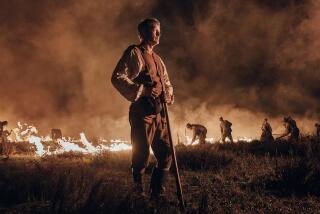Television Reviews : A Not-So-Great Attempt at Faulkner’s ‘Golden Land’
- Share via
The press release for the “Great Performances” presentation of William Faulkner’s “Golden Land” reads, by way of description:
“Ira Sternholt is a wealthy realtor, whose success has matched his ambition in a land of golden opportunity. The price, however, is the collapse of his family: A wife he doesn’t love, a foppish son, and a daughter involved in a sex scandal. Seeking refuge in the diversions Hollywood has to offer--drink and women--Ira is unable to sustain a relationship, even with his mistress, a woman who makes no demands and has no expectations.”
The actual production of “Golden Land” (airing at 9 tonight on PBS Channels 28, 15 and 24) reveals just about as much of character and circumstance as does the release, which should now spare you an hour spent in the empty presence of a set of characters about whom meagerness is confused with blasted hopes.
A great deal of the production, under Stephen Lineweaver’s design, has an atmospheric ‘30’s Hollywood look, aided by Shay Cunliffe’s costumes and James Brown’s hair styling. But this is a story that works from the outside in without going very far (there’s nothing more decadent about Hollywood in “Golden Land” than you’ll find in Sinclair Lewis’ “Main Street,” except that “Land” has infinitely less to offer by way of scope and social attitude).
William Hanley did the awkward and constricted screen adaptation of the Faulkner story, and Gene Reynolds directs his cast without a clue towards bringing their characters alive, as though he prefaced every shot by telling his actors, “remember, you’re all bitterly unhappy and the golden land is nothing but dreams lost in a sunlit place.”
Ira (James Sikking) dreams of Nebraska as a frozen tundra. His mother (Christina Pickles) dreams of its wheat fields combed by summer wind. Those images are supposed to tell us their whole story.
Leslie Hope as Ira’s declasse daughter has a moment or two where she conveys an unknowing, tender innocence, and Clyde Kusatsu in one scene tells us a great deal more about the American entrepreneurial spirit on the move than does Sikking’s grim Ira.
Great performances? Who’s kidding whom?
More to Read
The complete guide to home viewing
Get Screen Gab for everything about the TV shows and streaming movies everyone’s talking about.
You may occasionally receive promotional content from the Los Angeles Times.






